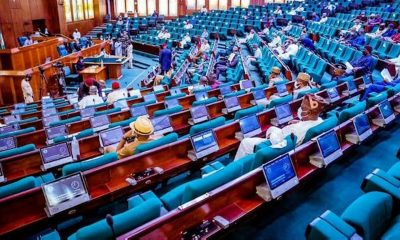General
PIA and Gestation of Acts

By Jerome-Mario Chijioke Utomi
Many Nigerians with critical interest had hitherto believed that the advent of Nigeria’s Petroleum Industry Act (PIA) 2021, which was signed into law in the year mentioned above, and arguably the most audacious attempt to overhaul the petroleum sector in Nigeria, would solve the real and imagined challenges in the nation’s petroleum sector, and turn the Niger Delta region, particularly host communities, to a zone of peace in their relationship with crude oil prospecting and exploration companies.
However, facts have since emerged that instead of providing the legal, governance, regulatory and fiscal framework for the Nigerian petroleum industry and the host communities, the Petroleum Industry Act has, contrary to expectations, become a first line of conflict between crude oil prospecting, exploration companies and their host communities.
Like other Acts that guided crude oil production in the past, PIA has similarly become a toothless bulldog that neither bites nor barks. In fact, analysts and industry watchers have come to a sudden realization that nothing has changed.
Among many examples, the recent 14 days ultimatum/threat by an oil-rich community of Tsekelewu (Polobubo) in Warri North Local Government Area of Delta State to shut down ongoing exploration activities of Conoil Producing Limited if the company failed to reach a definite agreement with the community on the implementation of Chapter 3 of the PIA for the Tsekelewu bloc of communities, supports this assertion.
Entitled ‘Fourteen (14) Days Ultimatum to Implement Chapter 3 of 2021 Petroleum Industry Act (PIA) in Tsekelewu (Polobubo) Host Community and Bloc of Communities by Conoil Producing Limited at OML 103’, the petition/ultimatum, dated December 30, 2022, signed by the President-General of the Tsekelewu (Polobubo) Development Association, Dr Bright Abulu, and the spokesman of the association, Mr Christmas Ukagha, and addressed to the Managing Director/Chief Executive Officer of Conoil Producing Limited, among other things, lamented that they adopted the option due to seemingly snobbish attitude of the management of Conoil as the company’s management had refused to honour letters asking for a meeting with the TCDA on the issue of the PIA implementation.
Essentially, while the people of Tsekelewu (Polobubo) host community continue to wait for what becomes the outcome of their ultimatum, there is indeed, greater evidence that points to the fact that the underlying premise behind PIA enactment has been defeated.
There is equally a reason for concern that what is currently happening between oil companies and their host communities may no longer be the first half of a reoccurring circle but, rather, the beginning of something negatively new and different.
A tour by boat of creeks and coastal communities of Warri South West and Warri North Local Government Areas of Delta State will amply reveal that the much-anticipated end in sight of gas flaring is actually not in sight.
In the same manner, a journey by road from Warri via Eku-Abraka to Agbor and another road trip from Warri through Ughelle down to Ogwuashi Ukwu in Anoicha Local Government of the state shows an environment where people cannot properly breathe as it is littered by gas flaring points.
To a large extent, the above confirms as true the recently published report, which, among other concerns, noted that Nigeria has about 139 gas flare locations spread across the Niger Delta both in onshore and offshore oil fields where gas which constitutes about 11 per cent of the total gas produced are flared.
Apart from the health implication of flared gases on humanity, their adverse impact on the nation’s economy is equally weighty.
For instance, a parallel report published a while ago underlined that about 888 million standard cubic feet of gas were flared daily in 2017. The flared gas, it added, was sufficient to light up Africa, or sub-Saharan Africa, generate 2.5 gigawatts (GW) of power or produce 50 million barrels of oil equivalent (boe) or produce 600,000 metric tonnes of liquefied petroleum gas (LPG) per year, produce 22 million tonnes of carbon dioxide (CO2), feed two-three liquefied natural gas (LNG) trains, generate 300,000 jobs, able to attract $3.5 billion investment into Nigeria and has $350 million carbon credit value’. This is an illustrative pointer as to why the nation economically gropes and stumbles.
Looking at the enormity of the health and economic losses inherent in gas flaring, one may be tempted to ask what set the stage for gas flaring in Nigeria. The politics that keep it going, and why it ‘flourishes unabated?
Banking on what experts are saying, the major reason for the flaring of gases is that when crude oil is extracted from onshore and offshore oil wells, it brings with it raw natural gas to the surface and where natural gas transportation, pipelines, and infrastructure are lacking like in the case of Nigeria, this gas is instead burned off or flared as a waste product as this is the cheapest option. This has been on since the 1950s when crude oil was first discovered in commercial quantity in Nigeria.
While Nigeria and Nigerians persist in encountering gas flaring in the country, even so, has successive administrations in the country made both feeble and deformed attempts to get it arrested.
The facts are there and speak for it.
In 2016, President Muhammadu Buhari-led administration enacted Gas Flare prohibition and punishment), an act that, among other things, made provisions to prohibit gas flaring in any oil and gas production operation, blocks, fields, onshore or offshore, and gas facility treatment plants in Nigeria.
On Monday 2nd.September 2018, Dr Ibe Kachikwu, Minister of State for Petroleum (as he then was), while speaking at the Buyers’ Forum/stakeholders’ Engagement organized by the Gas Aggregation Company of Nigeria in Abuja, among other things, remarked thus, ‘I have said to the Department of Petroleum Resources, beginning from next year (2019 emphasis added), we are going to get quite frantic about this (ending gas flaring in Nigeria) and companies that cannot meet with extended periods –the issue is not how much you can pay in terms of fines for gas flaring, the issue is that you would not produce. We need to begin to look at the foreclosing of licenses’.
That threat has since ended in the frames as the Minister did little or nothing to get the threat actualized.
The administration also launched the now abandoned National Gas Flare Commercialization Programme (NGFCP, a programme, according to the federal government, aimed at achieving the flares-out agenda/zero routine gas flaring in Nigeria by 2020.
Again, like a regular trademark, it failed.
Away from Buhari’s administration, in 1979, the then federal government, in a similar style, came up with the Associated Gas Re-injection Act, which summarily prohibited gas flaring and also fixed the flare-out deadline for January 1, 1984. It failed in line with the leadership philosophy in the country.
Similar feeble and deformed attempts were made in 2003, 2006, and 2008.
In the same style and span, precisely on July 2, 2009, the Nigerian Senate passed a Gas Flaring (Prohibition and Punishment) Bill 2009 (SB 126) into Law, fixing the flare-out deadline for December 31, 2010- a date that slowly but inevitably failed.
Not stopping at this point, the FG made another attempt in this direction by coming up with the Petroleum Industry Bill, which fixed the flare-out deadline for 2012. The same Petroleum Industry Bill (PIB) got protracted till 2021, when it completed its gestation and was subsequently signed into law by President Buhari as PIA.
Despite this vicious movement to save the industry, the environment and its people, the Niger Delta challenge remains.
So, the question that is as important as the piece itself is; if this legion of laws/Acts cannot save the people of the region, who will? When will it complete its gestation period and deliver the targeted result to the people of the Niger Delta region?
While the answer(s) to the above question remains germane, this piece holds the opinion that to permanently resolve the Niger Delta question, the people of the region must be directly involved in the management of their resources. Call it resource control; you may not be far from the truth!
Utomi Jerome-Mario is the Programme Coordinator (Media and Policy) at Social and Economic Justice Advocacy (SEJA), Lagos. He can be reached via je*********@***oo.com/08032725374
General
Court Acquits Abba Kyari of 23-Count Asset Declaration Charge

By Adedapo Adesanya
Justice James Omotosho of the Federal High Court in Abuja has discharged and acquitted the suspended Deputy Commissioner of Police Abba Kyari of a 23-count charge of alleged non-declaration of assets filed against him by the National Drug Law Enforcement Agency (NDLEA).
Mr Kyari is being charged alongside his two brothers, who were accused of swearing to false affidavits to conceal the origin of some properties.
The court in its judgment held that the NDLEA failed to provide sufficient evidence to prove its case against the defendants, which is mostly the non-declaration of land properties.
Justice Omotosho noted that proving ownership of landed properties can be done through traditional history, title, acts of possession and possession by connection.
The prosecution did not provide any of these documents to show that the said properties located in Fountain Estate, Kasana, which belong to Ramatu Kyari, are truly owned by the police officer.
Also, the court held that the prosecution did not provide the same material evidence linking Mr Kyari to properties in Linda Choko Road, Asokoro and also Maiduguri in Borno State.
Mr Kyari, in his defense said the properties in Borno belonged to his father, which he left for him and his siblings.
It was judged that the prosecution did not prove otherwise, adding that the prosecution charged Mr Kyari’s brothers in bad faith for alleged conspiracy, which they failed to prove.
General
NCC Arraigns Netnaija’s Emma Analike Over Alleged Copyright Infringement

By Modupe Gbadeyanka
The chief executive of Netnaija Media Enterprises, Mr Emmanuel Analike, has been arraigned before a Federal High Court sitting in Abuja by the Nigerian Copyright Commission (NCC).
The suspect appeared before Justice Suleiman Liman on Wednesday over allegations bordering on copyright infringement.
He was accused by the NCC of using his online platform to make movies and others not belonging to him available for users to download on the internet.
According to the agency, Mr Analike has infringed copies of audio-visual materials distributed online via his website for online users. Netnaija is an online movie and music download site.
The prosecution counsel, Ms Gladys Isaac-Ojo, who works with the NCC, told the court that the defendant committed an offence contrary to and punishable under Section 44 (1) (a) of the Copyright Act, 2022.
However, Mr Analike pleaded not guilty to the charges preferred against him, prompting his counsel, Nnemeka Ejiofor, seek his bail.
The lawyer informed the court that the application was filed on Monday and supported by 23 paragraphs of affidavits and a written address.
But the judge refused to give a bench ruling and adjourned the ruling of the bail application to Monday, March 9, 2026, ordering the remand of the Netnaija chief in Kuje Correctional Centre.
General
Entries Open for ClimateLaunchpad Green Business Ideas Competition

By Modupe Gbadeyanka
Entries for the 2026 edition of the world’s largest green business ideas competition, ClimateLaunchpad, have opened.
In 2025, the programme, organised by Climate KIC, received over 2,700 applications from 40 countries. The winning ventures gain prize money, investor connections, and access to a global cleantech network.
This year’s edition is expected to be bigger and better, with climate innovators, green venture builders, and entrepreneurs from around the world given the opportunity to apply.
Since its inception in 2014, the programme has supported nearly 5,000 ideas across 97 countries, and this year, it is expanding its presence in Asia with Singapore hosting both the regional final and global grand final for the first time.
Participants move through several stages, including an initial mini-course to refine the concept, an intensive multi-day Boot Camp led by expert trainers, targeted coaching to perfect value propositions and investor pitches, national and regional finals, and a place at the global grand final, with prizes and access to a global climate network.
“Strengthening ClimateLaunchpad’s presence in Asia marks a profound new chapter for this programme and for the climate innovation movement more broadly. Asia is where so much of the world’s climate and nature future will be shaped, through business leadership, public-private partnerships and long-term strategic thinking,” the chief executive of Climate KIC, Kirsten Dunlop, stated.
“We look forward to supporting this momentum with new business ideas and innovation ecosystem collaborations across more than a dozen countries.
“This expansion opens space for deeper cross-cultural connections and for first-time founders to turn sparks of imagination into solutions that serve both people and planet,” Dunlop added.
Also commenting, the chief executive of Better Earth Ventures, Ms Rebecca Sharpe, said, “We are proud to host ClimateLaunchpad’s regional and global grand final in Singapore and to convene an international group of climate entrepreneurs from more than 50 countries.
“Climate solutions are emerging from every corner of the world, and bringing them together creates the kind of cross-border exchange and collaboration this moment demands. Our focus is to ensure early-stage founders have the structure, ecosystem access and support needed to move from idea to credible impact.”
-

 Feature/OPED6 years ago
Feature/OPED6 years agoDavos was Different this year
-
Travel/Tourism10 years ago
Lagos Seals Western Lodge Hotel In Ikorodu
-

 Showbiz3 years ago
Showbiz3 years agoEstranged Lover Releases Videos of Empress Njamah Bathing
-

 Banking8 years ago
Banking8 years agoSort Codes of GTBank Branches in Nigeria
-

 Economy3 years ago
Economy3 years agoSubsidy Removal: CNG at N130 Per Litre Cheaper Than Petrol—IPMAN
-

 Banking3 years ago
Banking3 years agoSort Codes of UBA Branches in Nigeria
-

 Banking3 years ago
Banking3 years agoFirst Bank Announces Planned Downtime
-

 Sports3 years ago
Sports3 years agoHighest Paid Nigerian Footballer – How Much Do Nigerian Footballers Earn






















